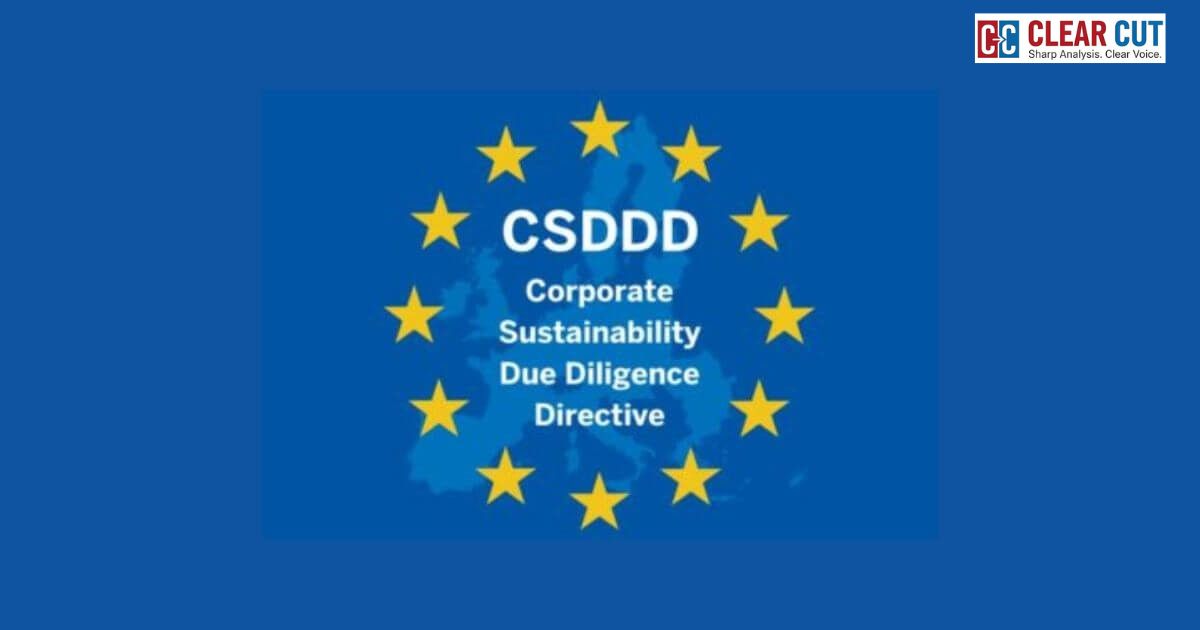Photo Credit: Janmojaya Barik
Clear Cut Child Protection Desk
New Delhi, UPDATED: Sep 22, 2025 04:15 IST
Written By: Janmojaya Barik
The European Union has traditionally been a world leader in climate action, human rights, and sustainable development. In this vein, the EU has just implemented the Corporate Sustainability Due Diligence Directive (CSDDD), commonly called the EU Sustainability Law. The directive is one of the most ambitious efforts to govern how businesses operating in the EU respond to social and environmental challenges across their supply chains. Its enactment is an important moment in corporate responsibility and also generates serious controversies over costs, practicability, and international competitiveness.
What the Law Demands
In its essence, the CSDDD demands that big businesses doing business in the EU, and some non-EU companies with big businesses within the EU, detect, prevent, and mitigate adverse human rights and environmental effects within their supply chains. The requirement encompasses a broad range of concerns such as –
1) Human Rights: Prevention of child labour, forced labour, hazardous working conditions, and exploitation.
2) Environment: Prevention of deforestation, biodiversity loss, pollution, and emissions that harm the climate.
3) Supply Chains: Accountability not just to immediate suppliers but to indirect partners further down the chain.
On top of this, firms have to set up grievance mechanisms, report publicly on their due diligence activities, and in certain cases, take climate transition plans as per the Paris Agreement.
Non-compliance can be heavily penalized. EU member states must implement sanctions, and these can take the form of fines, exclusion from public procurement, and even civil liability for damages brought.
Rationale Behind the Directive
The directive is in response to the emerging consensus that voluntary corporate social responsibility efforts have not produced substantive change. Numerous multinational firms publishes sustainability reports, but is it mostly publicity stunts in stead of binding obligations ?
The EU seeks to establish an equal playing field in which responsible companies are not undercut by rivals that offload social or environmental costs. The law is also meant to safeguard consumers and citizens and make sure that the goods they purchase are not associated with exploitative practices or environmental damage.
Notably, the directive aligns with the EU’s wider Green Deal agenda that aims to make Europe the first climate-neutral continent by 2050. It enhances the EU’s geopolitical position to establish global standards that businesses across the world are required to adopt if they desire access to the European market.

Photo Credit : CISDE.org
Resistance and Controversy
In spite of its aspirations, the CSDDD has been greeted with vigorous resistance by segments of the business sector. Opponents accuse that the legislation is extremely burdensome to comply with especially for those sectors with intricately complex global supply chains like textiles, energy, and tech.
For instance, ExxonMobil’s CEO recently called on the EU to abandon the law entirely, arguing that it causes uncertainty for investors and could deter companies from operating in Europe. This has also been expressed by trade associations, which caution that smaller suppliers from developing nations could be shut out if European companies determine that the costs of due diligence outweigh the advantages of dealing with them.
There is also a fear of regulatory fragmentation. While the directive establishes a minimum EU-wide standard, member states retain some discretion in implementation which could result in uneven or biased enforcement. Businesses worry that this patchwork will complicate compliance, especially for multinational firms already navigating a maze of regulations worldwide.
Opportunities and Long-Term Benefits
Its proponents believe that although in the short term, the law will test companies, it will make the European sector more competitive and exploitation free in the long term. By requiring them to follow these standards the EU compels businesses to upgrade supply chains, invest in green technologies, and have more solid ties with sustainable suppliers.
Additionally, international investors are increasingly making ESG criteria a priority. Firms that position themselves early in alignment with the directive can expect increased capital inflows and resilience in an economy that is fast changing towards sustainability. In this regard, the law is not just a regulatory duty but also a strategic advantage.
Global Ripple Effects
The EU Sustainability Law will extend its impact extraterritorially. Non-EU businesses with a certain revenue level will also have to conform if they are in the market of Europe. It may compel multinational business groups with headquarters in the US, Asia, or Africa to implement EU standards, thus propagating European values of corporate responsibility globally.
Already, other legal jurisdictions are observing intently. Germany and France already had national due diligence legislation in place even before the EU directive, and nations such as Canada and Japan have been contemplating similar frameworks. If the EU law is successful, it could lead to a world-wide convergence towards mandatory sustainability due diligence.
The EU Sustainability Law is a daring effort to meet the pressing social and environmental challenges of the era. In making the companies legally liable for the effects of their global value chains, the directive tries to transform sustainability from an aspirational promise into a mandatory company obligation.
But the way to the future is not smooth. The law creates genuine costs, poses questions of enforceability, and threatens unintended impacts on smaller players. It also provides long-term rewards through encouragement of innovation.




